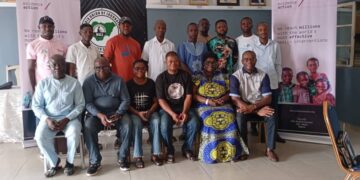By Asuquo Cletus
In a determined effort to curb the high rate of intestinal worm infections among school-age children, Evidence Action, in collaboration with the Federal and State Ministries of Health and the Cross River State Neglected Tropical Diseases (NTD) Programme, has initiated a media advocacy campaign in Calabar.
The media engagement is part of preparatory activities for the 2025 school-based deworming exercise, which is scheduled to begin in May across 14 local government areas of Cross River State.
Targeting over 912,854 children aged 5 to 14, the campaign aims to increase public awareness, foster community participation, and ensure the effective administration of deworming medication.
At a media parley held on Saturday at the Ernest Bassey Press Centre in Calabar, Tochi Ohaji, Senior Manager at Evidence Action, underscored the vital role journalists play in delivering accurate information and dispelling harmful myths that can hinder public health efforts.
“Nigeria is among the top three countries globally with the highest burden of schistosomiasis. More than 108 million Nigerians are at risk of worm infections, and over 48 million are school-age children. Deworming is not merely a medical intervention, it is essential for children’s education and development.”Ohaji said.
He emphasized that children infected with intestinal worms often suffer from poor nutrition, stunted growth, reduced concentration, and low school attendance.
The upcoming campaign seeks to break this cycle by administering Mebendazole for soil-transmitted helminths and Praziquantel for schistosomiasis both provided free of charge by the World Health Organization. The medications will be administered by trained teachers and healthcare workers in both public and private primary and junior secondary schools.
Since launching the programme in Nigeria in 2016, Evidence Action has facilitated the treatment of over 42 million children nationwide. In Cross River State, the annual campaign continues to reach 912,854 children.
“We support deworming programmes in five states Cross River, Lagos, Ogun, Oyo, and Rivers, each year, more than nine million tablets are distributed, and over 28,000 teachers and healthcare workers are trained to ensure safety and efficiency.”-he added
Ohaji also highlighted the programme’s affordability and scalability, noting that it costs less than $0.50 or ₦750 per child. “Despite its cost-effectiveness, misinformation can derail participation. That is why we are engaging with the media—to ensure every child is reached.”
Speaking at the event, Veronica Mark, the State NTD Programme Manager, reiterated the media’s critical role in community sensitization.
“The media is the bridge between the programme and the people. In many rural and riverine communities, misconceptions fuel resistance. Some parents believe the drugs are harmful or experimental. This is where journalists must step in to educate and reassure.”
She further emphasized the state government’s commitment to eradicating neglected tropical diseases through sustained partnerships and public cooperation.
“Cross River is fortunate to have dependable partners like Evidence Action. But community involvement is key. We urge parents to ensure their children are in school on deworming days. The drugs are safe, effective, and essential for their health and learning.”
The advocacy event featured a detailed presentation on the biology and symptoms of worm infections, the methodology for drug distribution, and global data showing that regular deworming can reduce school absenteeism by 25% and improve academic performance by up to 15%.
Journalists were also guided on how to address common community concerns, while plans were unveiled for a hotline and a series of radio jingles in local dialects to further reinforce campaign messaging.
Evidence Action’s advocacy drive will continue in the lead-up to deworming week with radio appearances, community outreach, and training sessions for local reporters.
“We are calling on all media professionals to become advocates of truth, health, and development,” Ohaji said. “When you write or speak, you are saving lives.”
As Cross River State prepares for the 2025 school-based deworming campaign, the programme’s success will hinge not only on effective logistics and supplies but also on the media’s ability to inform, educate, and mobilize the public ensuring that no child is left behind.














